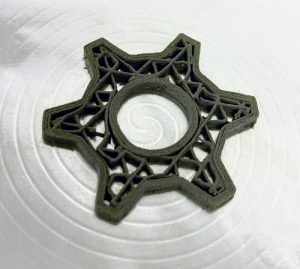 The production of complex metallic or ceramic components using additive manufacturing techniques represents one of the most investigated areas of modern materials science. The recent diffusion of low-cost 3D printing technologies offers new opportunities in this area.
The production of complex metallic or ceramic components using additive manufacturing techniques represents one of the most investigated areas of modern materials science. The recent diffusion of low-cost 3D printing technologies offers new opportunities in this area.
The approach we are pursuing is often called “robocasting”. This process involves the extrusion of colloids containing a solvent, some polymeric additives, and a significant fraction of inorganic powders. After printing, appropriate thermal treatments allow removing the solvent and the polymeric additives, obtaining the desired shape. Sintering produce the necessary densification.
The optimization of the entire process represents the core of our project. That includes the design and realization of optimized printers, the study of the complex sequence of processes involved in the post-printing thermal treatments, and the microstructural and mechanical characterization of the produced components. The aim is to obtain the designed parts with the desired phase composition, shape, porosity, and degree of sintering.
